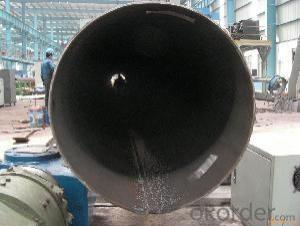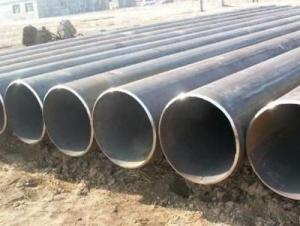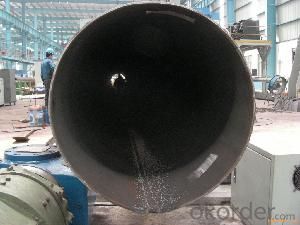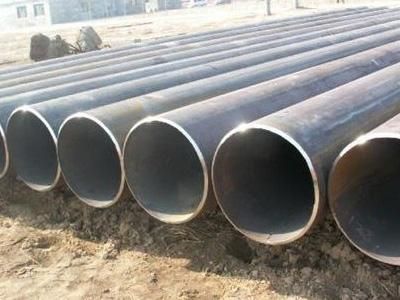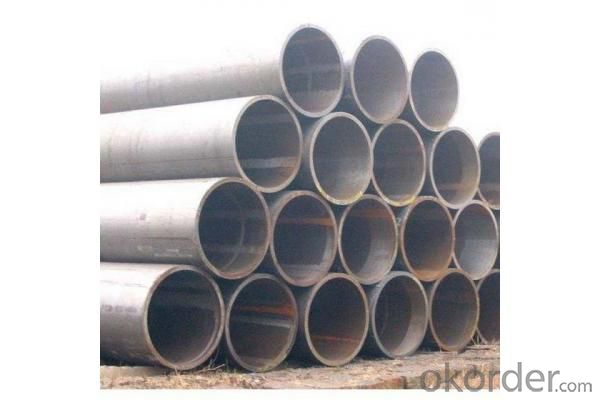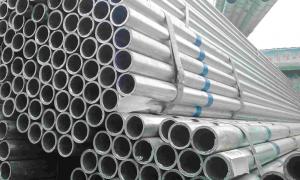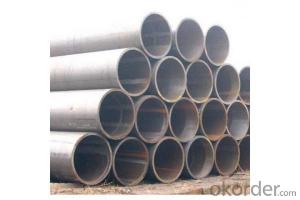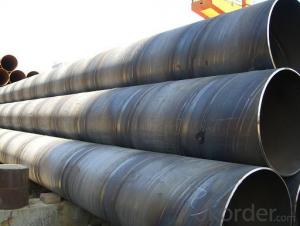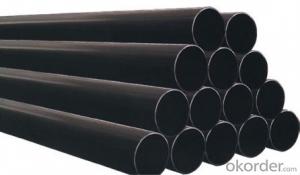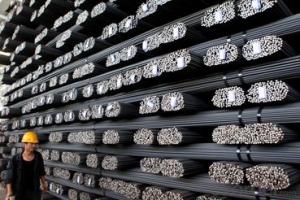LSAW STEEL PIPE 6'' -48''
- Loading Port:
- China Main Port
- Payment Terms:
- TT OR LC
- Min Order Qty:
- -
- Supply Capability:
- -
OKorder Service Pledge
OKorder Financial Service
You Might Also Like
Packaging & Delivery
Packaging Detail: | Normal exporting packing,in container or bulk vessel or as per clients' request |
Delivery Detail: | 2 months after confimed contract |
Specifications
Large Diameter API 5L X70 PSL2 LSAW Steel Pipe
Grade: X42, X46, X50, X52, X60, B, C
OD: 1.5"-28"
WT: SCH10-SCH160
Brand:TPCO
Large Diameter API 5L X70 PSL2 LSAW Steel Pipe
Specifications:
u Standard: API 5L
u Grade: B, C, X42, X46, X50, X52, X56, X60, X65, X70, X80
u OD: 1.5"-28"
u WT: SCH10-SCH160
u Length: 5-12m
u Ends Finish: plain end, bevel end, grooved end
u Surface Treatment: bare, black varnished, oiled finish, red color, anti-corrosion, 3PE, FBE or epoxy coating
u Technique: hot rolled or cold drawn
u Application: api 5l steel pipe for conveying oil, water, gas
u Invoicing: based on theoretical weight or actual weight
u Payment Terms: L/C at sight, T/T or Western Union
u Trade Terms: FOB, CFR, CIF
u Certification: ABS manufacturing assessment, ABS design assessment, API 5CT, API 5L, DNV manufacturer certificate, ISO9001 quality management system certificate, ISO14001 environment management system certificate, GB/T28001 occupational health and safety management system certificate, A1 class manufacturing license of special equipment certificate, CCS, GL, LR, SGS, TüV, PDE
- Q: What's the difference between round and round tubes?
- Round steel is generally refers to steel, the surface is not threaded, different from round steel pipe, round tube is round tube.
- Q: How do you join two steel pipes together without welding?
- One way to join two steel pipes together without welding is by using threaded connections. This involves screwing a threaded fitting onto each end of the pipes, creating a secure and durable connection. Additionally, other methods such as mechanical couplings or flanges can also be used to join steel pipes without welding. These methods provide a reliable and convenient alternative to welding for joining steel pipes together.
- Q: What is the difference between hot-dip galvanizing and electroplating for steel pipes?
- Steel pipes can be protected from corrosion using hot-dip galvanizing or electroplating, but these methods have distinct differences. With hot-dip galvanizing, the steel pipes are immersed in molten zinc, creating a strong bond with the steel. This results in a thick and durable zinc coating that effectively prevents corrosion. The entire surface of the pipe, both inside and outside, is uniformly covered, making hot-dip galvanizing ideal for comprehensive protection. Electroplating, on the other hand, involves depositing a thin layer of metal, usually zinc, onto the steel surface using an electric current. Unlike hot-dip galvanizing, electroplating does not form a metallurgical bond between the zinc and steel. Instead, it forms a mechanical bond, which is weaker and less long-lasting. The electroplated zinc layer is also thinner, offering less corrosion protection compared to hot-dip galvanizing. The application process is another point of differentiation. Hot-dip galvanizing requires immersion in molten zinc, which can be time-consuming. Electroplating, on the other hand, uses an electrolytic cell for zinc coating application, which is faster and more efficient. In conclusion, the thickness, durability, and bonding mechanism between zinc and steel distinguish hot-dip galvanizing from electroplating for steel pipes. Hot-dip galvanizing provides a thicker, longer-lasting coating with a metallurgical bond, making it superior for extended corrosion protection. Electroplating, however, creates a thinner coating with a mechanical bond, suitable for applications where a less robust level of corrosion resistance is acceptable.
- Q: What is galvanized steel pipe?
- Galvanized steel pipe is a type of steel pipe that has been coated with a layer of zinc to protect it from corrosion. This process involves immersing the steel pipe in a molten zinc bath, which creates a protective barrier on the surface of the pipe. The zinc coating helps to prolong the lifespan of the steel pipe, making it resistant to rust and other forms of corrosion. Galvanized steel pipes are commonly used in plumbing, water supply, and construction applications.
- Q: Can steel pipes be used for hydroelectric power plants?
- Yes, steel pipes can be used for hydroelectric power plants. Steel pipes are commonly used in hydroelectric power plants for various applications. They are primarily used in the penstock, which is a pipe that carries water from the reservoir to the turbine. The penstock is under high pressure, and steel pipes have the necessary strength and durability to handle the pressure and flow of water. Steel pipes are preferred in hydroelectric power plants due to their high tensile strength, corrosion resistance, and longevity. They can withstand the high-pressure conditions and flow rates of water, ensuring the efficient transfer of water from the reservoir to the turbine. Additionally, steel pipes have the advantage of being easily fabricated and installed. They can be customized to fit specific project requirements and can be welded or bolted together to form the desired length and shape. Furthermore, steel pipes are cost-effective compared to other materials commonly used in hydroelectric power plants, such as concrete or fiberglass. They provide a reliable and cost-efficient solution for conveying water in hydroelectric power plants, contributing to the overall efficiency and effectiveness of the power generation process. In conclusion, steel pipes are a suitable and commonly used material for hydroelectric power plants. They offer the necessary strength, durability, and cost-effectiveness required for conveying water from the reservoir to the turbine, making them an ideal choice for this application.
- Q: What are the applications of galvanized steel pipes?
- Galvanized steel pipes have a wide range of applications across various industries. They are commonly used in plumbing systems for water supply and drainage systems due to their corrosion resistance and durability. Additionally, they are used in the construction industry for structural supports, scaffolding, and fencing. Galvanized steel pipes are also widely utilized in agricultural irrigation systems and in the transportation of liquids and gases.
- Q: How do steel pipes compare to other pipe materials like PVC or copper?
- Steel pipes have several advantages over other pipe materials like PVC or copper. Firstly, steel pipes are incredibly durable and can withstand high levels of pressure and extreme temperatures, making them suitable for a wide range of applications. Secondly, steel pipes have excellent resistance to corrosion, which ensures their longevity and reduces the need for frequent maintenance or replacement. Additionally, steel pipes have a higher strength-to-weight ratio compared to PVC or copper, making them more robust and capable of handling heavy-duty tasks. However, steel pipes can be more expensive and require special equipment for installation. Overall, steel pipes are a reliable and versatile option that offers superior durability and performance compared to other pipe materials.
- Q: How do you measure the thickness of steel pipes?
- There are several methods available for measuring the thickness of steel pipes, depending on the desired level of accuracy. One commonly utilized technique is ultrasonic measurement. This involves employing an ultrasonic thickness gauge, which emits high-frequency sound waves that travel through the walls of the pipe and reflect back to the gauge. By calculating the time it takes for the sound waves to travel and return, an accurate measurement of the thickness can be obtained. This method is non-destructive and can be applied to both ferrous and non-ferrous materials. Alternatively, calipers or micrometers can be used for measurement. This entails manually measuring the outer diameter (OD) and inner diameter (ID) of the pipe, and then subtracting the ID from the OD to determine the thickness. However, it should be noted that this method is less precise compared to ultrasonic measurement. In cases where extreme precision is not necessary, a simple tape measure or ruler can be employed to measure the outer diameter of the pipe. The thickness can then be estimated by referring to standard pipe thickness charts or tables. It is essential to emphasize the significance of accurately measuring the thickness of steel pipes in various applications, such as construction, manufacturing, and engineering. Consequently, it is advisable to utilize suitable measuring tools and techniques to ensure precise results.
- Q: What are the disadvantages of using steel pipes?
- One disadvantage of using steel pipes is that they are prone to corrosion, especially in environments with high humidity or exposure to certain chemicals. This can lead to structural damage and reduced lifespan of the pipes. Additionally, steel pipes are relatively heavy and bulky, making transportation and installation more challenging compared to other pipe materials. Lastly, steel pipes can be more expensive than alternative materials, which can impact project budgets.
- Q: What is the cost of steel pipes?
- The cost of steel pipes can vary depending on various factors such as size, grade, quantity, and current market conditions. It is best to contact a supplier or check with local suppliers to get an accurate and up-to-date price quote.
Send your message to us
LSAW STEEL PIPE 6'' -48''
- Loading Port:
- China Main Port
- Payment Terms:
- TT OR LC
- Min Order Qty:
- -
- Supply Capability:
- -
OKorder Service Pledge
OKorder Financial Service
Similar products
Hot products
Hot Searches
Related keywords
